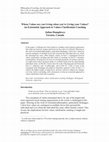Papers by Julian Humphreys
Philosophy of coaching, Nov 1, 2017
Philosophy of coaching, Nov 1, 2017
Philosophy of Coaching: An International Journal
Philosophy of Coaching: An International Journal, 2017
Journal of Applied Communications, 2018
A review of The Leadership Gap: What Gets Between You and Your Greatness, by Lolly Daskal.

Philosophy of Coaching: An International Journal
In this paper, I challenge the claim made by a leading coach training organization that values ar... more In this paper, I challenge the claim made by a leading coach training organization that values are intrinsic, unique and fixed over the course of a lifetime. Drawing on the work of existential philosophers, particularly Heidegger, I show how values are instead contingent on multiple forces that surround the individual and over which the individual has some, albeit limited, control. In Part I, I distinguish between values clarification coaching and other kinds of coaching. In Part II, I introduce existentialism, showing how its focus on essential questions of existence and how we might answer those questions makes it a suitable framework for understanding individual values. In Part III, I look at how the work of Kierkegaard and Nietzsche led to a 'subjective turn' in philosophy, and in Part IV, I look at some of the conceptual tools Heidegger developed to determine subjective truth. In Part V, I explore the hidden origins of subjectivity, and how collective subjectivity changes over time, before concluding with a discussion of what an existential approach to values clarification looks like in practice.
Philosophy of Coaching: An International Journal
Philosophy of Coaching: An International Journal
This paper situates the coaching/therapy divide within the context of new regulations in Ontario,... more This paper situates the coaching/therapy divide within the context of new regulations in Ontario, Canada, that limit the use of the term 'psychotherapy,' and the practice of psychotherapy. Taking Co-Active Coaching and Acceptance and Commitment Therapy (ACT) as representative examples of coaching and therapy respectively, I examine each in turn, showing that Co-Active Coaching and ACT, as they are described by their founders, overlap in important ways, to the point they are almost indistinguishable in practice. I conclude that artificially distinguishing between coaching and therapy is unhelpful for therapists and coaches, as well as the client populations they serve.
Philosophy of Coaching: An International Journal, 2016
Philosophy of Coaching: An International Journal, 2016
Philosophy of Coaching: An International Journal, 2016
Thelonious Monk's 1964 solo piano interpretation of "These Foolish Things" alternates between two... more Thelonious Monk's 1964 solo piano interpretation of "These Foolish Things" alternates between two distinct "voices" -a virtuosic voice, that cites the Western classical music tradition and its associated body, and a "visceral" voice that cites and authorizes a very different kind of body. While the virtuosic voice uses technical proficiency to mask the idiosyncratic body, the visceral voice draws attention away from the sound of the piano toward the idiosyncratic body producing it.
Teaching Documents by Julian Humphreys










Uploads
Papers by Julian Humphreys
Teaching Documents by Julian Humphreys